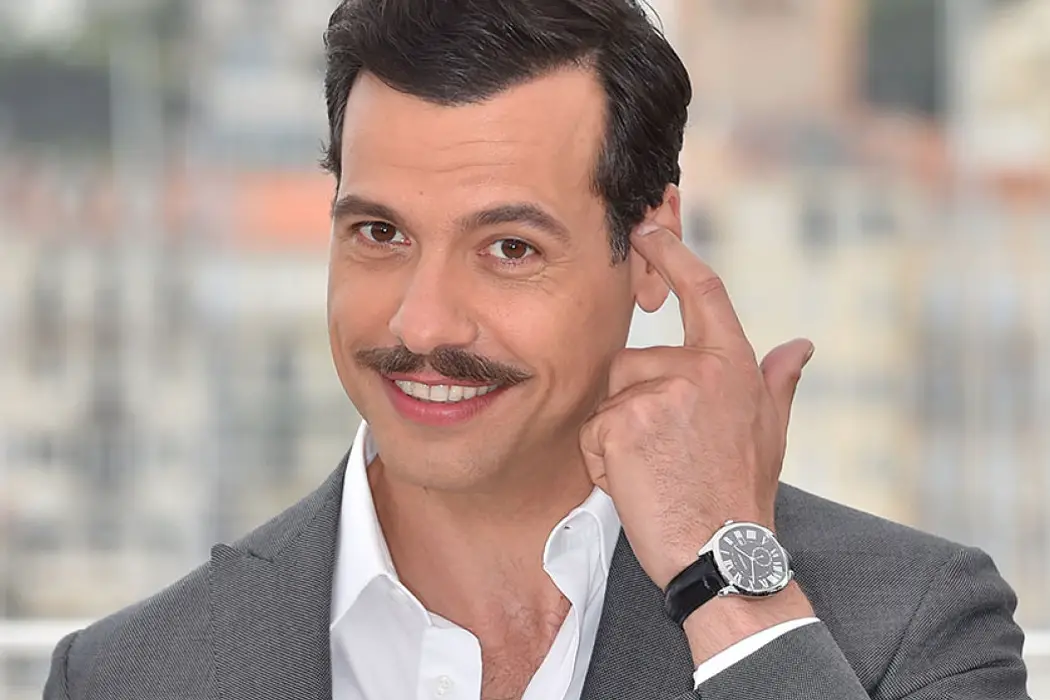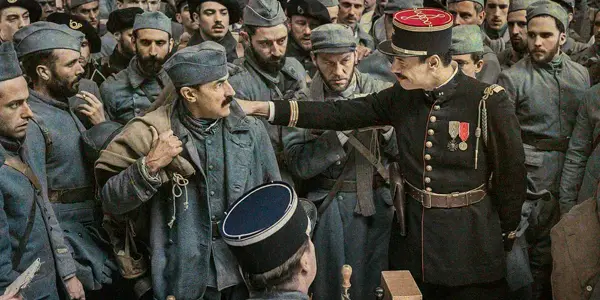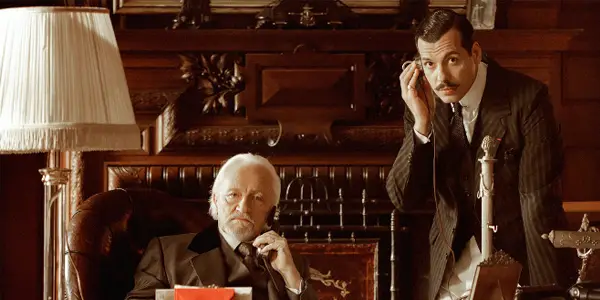Interview With Laurent Lafitte, Star Of SEE YOU UP THERE

Alex is a 28 year-old West Australian who has a…
Coming off scoring a major 13 nominations at the recent 2018 Cesar Awards (and winning 5, including Best Director), Albert Dupontel’s ambitious adaptation See You Up There has now begun its roll of international premieres, making its Australian debut at the 2018 Alliance Française French Film Festival.
Based on the Pierre Lemaitre’s beloved 2013 book The Great Swindle (Au revoir là-haut), See You Up There is an epic post-World War 1 drama about Albert Maillard (played by Dupontel), a soldier whose near fatal experience during a brutal war scenario causes his young companion Édouard Péricourt (Nahuel Pérez Biscayart, the breakout star of BPM) to have his face severely disfigured by mortar fire. This tragic accident ties the two men together after the war finishes, which results in the formation of an elaborate money-making scheme involving fake war memorials that occurs after Péricourt fakes his own death.
One of the movie’s major stars is Laurent Lafitte, the highly proclaimed French actor whose major cinematic projects include Paul Verhoeven’s Elle, the Pierce Brosnan starring rom-com The Love Punch, AFF2016 favourite Boomerang and the box office smash Papa Ou Maman. In See You Up There, Lafitte plays Captain Henri d’Aulnay-Pradelle, the villainous army captain whose homicidal actions unwittingly binds the lives of the two affected soldiers.
I was able to speak with Laurent Lafitte about how he got the role, Albert Dupontel’s unique directional style, the artistic influences of his performance and the importance of seeing the film in a cinema.

Alex Lines for Film Inquiry: First off I want to say congratulations for all your success at the Cesar Awards, I imagine it must be pretty exciting getting the Best Supporting Actor nomination?
Laurent Lafitte: Yes, I didn’t get the prize, but I got the nom. It’s a good start.
You had some pretty healthy competition against BPM.
Laurent Lafitte: Yeah.
So with your role in See You Up There, I understand that you did something quite unusual to get the role – you wrote Albert a letter?
Laurent Lafitte: Oh, how did you know that?
Albert mentioned it in his interview for Rolling Stone.
Laurent Lafitte: Yes actually, I wrote him a letter but I thought he would think of me for the part of Albert and he offered me the part of Pradelle, so I was a bit surprised. But I thought, Okay, why not? It’s one of the first times that I’ve written to a director, I wasn’t expecting anything back, I just wanted to write to him because I’ve read the book and when I heard that he’d be doing the adaptation, I just thought it was a great idea and I just wanted to share that with him. Sometimes I write to a director but I don’t expect anything back, sometimes saying that I enjoyed a certain person’s piece of work and I really wanted to share my enthusiasm of it with them.
I assume it must be quite a risky endeavour then, because if you say the wrong thing or be too forward, it might hurt your chances.
Laurent Lafitte: I don’t do it very often, only 3-4 times, when I’ve been really impressed with somebody’s work.
I saw the film as a tribute to veterans, those affected by war. Would you say this is one of the elements that attracted your interest?
Laurent Lafitte: Yes but it’s not a tribute to heroes. It’s a tribute to victims. It’s a very anti-war, anti-terrorism piece of art, it really says that there are no war heroes, there are just victims with heroic behaviours. There are only victims.
I read an interview with Albert where he was saying that he did some very heavy rehearsals before shooting, he noted that this was quite different for you, how did you find this?
Laurent Lafitte: Yes, to begin with, I wasn’t that keen to rehearse so much, because I felt that it would be emotionally spoil the scenes and if we go too far, too deep into the scenes before shooting, maybe we will kill them. But it didn’t happen and I think Albert was right with having so many rehearsals, because once on set, he didn’t have time to direct, it was a very big ship to sail, he really needed to be focused on his angles, his camera. Yes, I’m glad we rehearsed so much.
With your character Captain Pradelle, was it quite important to you to inject the character with humour?
Laurent Lafitte: Yes, he brings a dark humour/dimension to the film, it’s the baddie you like to hate, you enjoy hating him. That was important to find the balance, the real threat for the two heroes and at the same time, Albert wanted the audience to enjoy watching him do his thing.
Yeah I feel that in your portrayal, that it’s important that you yourself not judge the character, I believe that people who do that end up with very ‘moustache-twirling’ villain performances.
Laurent Lafitte: Yes, absolutely.
That touches on an interesting division I was thinking about, the difference between a sympathetic character and an entertaining character. So your character does some pretty bad things in the film, you enjoy watching him, but you’re not on his side. I thought it was similar to something like Leonardo DiCaprio in Wolf of Wall Street.
Laurent Lafitte: Yes, but in the Wolf of Wall Street, Leonardo is caught into a system that is stronger than him. In See You Up There, my character organises the system. So they’re quite different. For me, Pradelle is a Disney baddie. He’s a baddie, but you still enjoy watching him.

Your character is quite comedic, but I’d say between this, Elle, KO and the Papa Ou Maman series, you’ve managed to explore a real diverse range of roles. Do you believe that it’s an intentional decision, or something that’s just kind of happened?
Laurent Lafitte: Well, actors are always dependent on what they receive, I’ve had the chance to see very different scripts with very different characters, so it was a great chance to explore a different universe, with very different directors, so I’ve been very lucky.
I read that KO got quite a strong response, because it was the darkest character that you’ve played.
Laurent Lafitte: Yes, he’s very dark. Have you seen the film?
No, it’s one that hasn’t hit Australia yet.
Laurent Lafitte: Okay, yes, he goes through a very strange journey, that really looks like a nightmare. There’s quite a lot of empathy with that character.
As an actor, do you think there’s still a strong tendency to typecast actors, especially those in comedy?
Laurent Lafitte: Typecast? Yes. I think we always have the tendency, but even the audience is typecasting actors. That’s why when you get very different propositions like I’ve received, you’re quite fortunate.
That’s something I feel definitely extends to directors as well, See You Up There is quite a departure from Albert’s previous work, like The Villain, which were much smaller comedies.
Laurent Lafitte: Yes, but I do think that there’s still the DNA of Albert’s universe in there, there’s something very rebellious and anarchic in his work. It’s a very political film.
Obviously adapting a book is a big challenge, and whilst my perspective in Australia is different, I wanted to ask, is the book quite a major part of literary pop culture in France?
Laurent Lafitte: In France yes, it’s a very major piece of literature. It received the Prix Goncourt, which is the most prestigious literary prize in France, and it’s been a huge success there too.
Would you say that for your performance, you took from the book or from Albert’s interpretation of that character in the script?
Laurent Lafitte: Well both, because I couldn’t take the book out of my mind. Usually I don’t read books when I’m doing a film if it’s adapted from one, but when he offered me the part, I had already read it. There are some elements from the book that we couldn’t put in the film of course, otherwise it would’ve lasted several hours.
It helped me connect with the character, because in the book he comes from a very traditional aristocratic French family, lost all the money like many aristocratic families, he buys the family castle and he starts to refurbish it with the money from his little scheme. That was interesting for me, because that’s his wound, not to judge the characters, even if they bastards, I always try to find the excuse as to how they started.
One of the actors that you share a great amount of screentime with is Niels Arestrup, whose probably most well known for being one of Jacques Audiard’s go-to guys [A Prophet, The Beat My Heart Skipped]. How was working with him? He really sells the stone cold stoicism as Pericourt’s father.
Laurent Lafitte: On set he’s very quiet, but he’s so powerful that he doesn’t have to do much. It helps you because the way he looks at you, he brings you into the scene and like it’s when you play tennis, the better the guy you’re playing with, the better you progress, all I had to do was follow him.

Due to your extensive history in theatre, TV and film, have you ever thought about writing your own movie?
Laurent Lafitte: I did a one-man show in 2009 that I wrote, I also had a radio program that I wrote. I’m writing a film at the moment, yes.
Would you direct and act in the film yourself?
Laurent Lafitte: Yes.
In that previously mentioned interview with Albert, he mentioned that he was indifferent to the idea of playing the main role in his own film.
Laurent Lafitte: Yeah he didn’t want to play it to begin with, it was another actor involved in it that dropped out, so that’s why Albert decided to do it, but it was not his first intention to play the character himself.
With See You Up There being a part of this Australian festival, in terms of his French release, would it be considered a Blockbuster in France or an art house movie?
Laurent Lafitte: No I don’t think it’s a blockbuster, we don’t really do blockbusters in France. It’s a film that’s meant to touch a large audience, it’s not a blockbuster though. There’s a very auteur dimension to it, it’s an auteur film.
I find it interesting that with all countries, the scope of films that are made in that country compared to the amount that are actually distributed worldwide is quite vast, obviously the major French films to gain worldwide recognition is BPM, Raw and Let the Corpses Tan. Much like I was stating before with my inability to see KO, there’s so many French films that simply don’t get the international distribution that they deserve, is this something that you had any thoughts about?
Laurent Lafitte: I don’t know. I think that when a film is making it bigger nationally, it gets pushed overseas and sometimes the audience isn’t always fair with movies, so sometimes there are some really good films that never get released abroad, it’s a shame, but there’s so many movies. What is great now with the internet, if there is one great thing about it, it’s that you have so much access to films that are not released in your own country.
Definitely, apps like Netflix and YouTube have helped broaden the scope.
Laurent Lafitte: Yes, in a way. But it has also created a habit of experiencing films at home, so it’s a risky balance.
See You Up There is a film that definitely needs to be seen in a theatre.
Laurent Lafitte: Yes, absolutely. Even for tiny intimate films, apart from the very loud sound and a very big image, you’re also there to share with other people. So even with intimate dramas or a comedy, that’s one of the main things with movies – you’re sharing the same thing at the same time with several hundreds of people in the same room and that’s what I miss when I’m watching things on the internet. I like sharing these experiences with other people, it’s like going to a concert.
Especially with comedies, it’s getting that immediate reaction from people. Watching them alone at home is never quite the same.
Laurent Lafitte: Yes, it’s less fun.
I was talking to a friend the other day, and she was saying that when Elle was on the festival circuit, they screened it on a giant IMAX screen, that’s an intimate drama and she said it was a much better experience on that format.
Laurent Lafitte: Oh yes, I’m sure it was.
Film Inquiry thanks Laurent Lafitte for taking the time to talk with us.
Laurent Lafitte will be joined by festival artistic director Philippe Platel at Cinema Paradiso on Thursday, March 15 where they will take part in a Q&A following the 6.20pm screening hosted by 6PR film critic Mark Naglazas. Tickets for this Q&A can be purchased here.
Does content like this matter to you?
Become a Member and support film journalism. Unlock access to all of Film Inquiry`s great articles. Join a community of like-minded readers who are passionate about cinema - get access to our private members Network, give back to independent filmmakers, and more.













